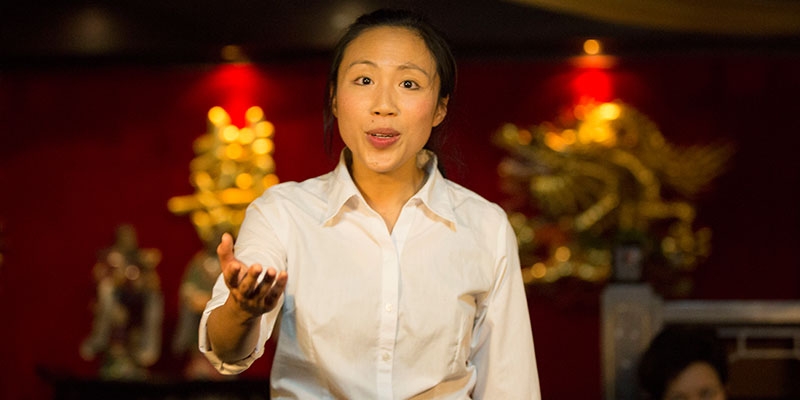Britain has welcomed immigrants for centuries; she has also waved farewell to many citizens. The movement of people across the globe is a natural seeking-out of a better life, whether fleeing persecution or war, or for economic reasons. Or simply better weather. This can be seen in the Pilgrim Fathers and the intrepid (and epic fail) of the Darien Scheme, through the much-needed workers on the Windrush to the Vietnamese Boat People and the recent and continuing tragic events of refugees trying to cross the Mediterranean. The play, From Shore to Shore, was devised from the real accounts of migration, family and belonging of Chinese immigrants to Leeds and West Yorkshire. Written by Mary Cooper in collaboration with MW Sun, has been a work in progress since 2014 and is designed to be performed in Chinese restaurants, perhaps to pay homage to the mainstay of Chinese ventures in the UK.
Tonight’s venue is Saigon Saigon in the heart of Edinburgh, a well-established restaurant popular with anyone seeking excellent dim sum. The play is set out in the downstairs private dining room and is a sold-out event. The room is overly warm, perhaps because the noise of the air-conditioning would be distracting, but there’s a bottomless pot of jasmine tea to quench thirst. First course is chicken and sweetcorn soup; this is thin and sweet but plentiful and we all tuck in. Around the table is a mixed bunch, each, as is discovered during the meal, with our own connection to the topic of the play. We are immigrants, travellers, cross-cultural marriages and have interesting experiences to share. This is who the play attracts as an audience. People who understand the question of where we belong; is our cultural identity that of our forefathers or that of our adopted country? Or a mix of both?
The play itself is woven expertly from three story threads, that of a boy separated from his mother during the Japanese invasion of China, told as the older version looks back at his life; a teenage girl struggling with her cultural identity having been born in the UK but her childhood in Hong Kong; and the third, a high-achieving woman who can never seem to be enough for her parents (in lieu of a son). The immediate concern of the storyline is one of connections, belonging and food as a metaphor for longing and hope.
The stories are touching, uplifting and yet harrowing in places, exposing the hidden social history in living memory, of atrocities, starvation, war, the separation of families and the necessity of selling children. The women are presented as pragmatic, stoic and exceptionally strong; it would be difficult to tell whether this was a Northern trait or a Chinese one; perhaps the Chinese community found a kinship in their north of England home. The universal parental desire for children to achieve better than them is made more poignant by the backdrop of the Cultural Revolution and the events of Tiananmen Square, and the issues of cultural negativity like gambling and drinking are countered by the strength of religious belief. The cast bring the different characters emphatically to life, under the astute direction of David KS Tse, using a mix of English, Mandarin, Cantonese and Hakka. This switching between languages adds to the authenticity of the stories.
The downside of dinner-theatre is, inevitably, that is cannot be truly one thing or another, much like a sofa-bed where there is neither a great night’s sleep nor a comfy night in. It’s not immersive either, and some audience members have to turn their chairs to watch. There is a frequent beeping noise from the kitchens which spoils the atmosphere somewhat. After the play ends, the main course is brought out; six huge dishes, plenty to go around. Quantity, however, trumps quality on this occasion, and considering Saigon Saigon’s excellent reputation, it is surprising the restaurant had not presented a set menu more in keeping with the regions covered in the play. But, as one diner put it, “I don’t know how they could do all this for the price.” The two strands, dinner and play, seem not connected enough and it feels a little make-shift. But, it is an accepted fact that the cuisine of an immigrant country changes to suit the palate of the host country, hence chicken tikka masala being voted Britain’s favourite dish a few years back.
As a social history project, From Shore to Shore is a fascinating and moving insight into the living memories of a particular section of society, one which reveals a glimpse of the incredible journey endured to be on this island we all call home.
